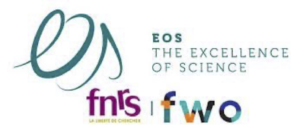The journey of a memory: dynamics of learning and consolidation in maturation and ageing

Excellence of Science (EOS) MEMODYN consortium : what is it and what have we learned ?
- EOS MEMODYN ia a scientific consortium gathering experts from five different Belgian and UK universities: ULB [Philippe Peigneux, Xavier de Tiège, Vincent Wens, Charline Urbain], KULeuven [Stefan Swinnen, Dante Mantini, Genevieve Albouy], UGent [Tom Verguts, Wim Fias, Nico Böhler], ULiege [Steve Majerus, Christophe Phillips, Fabienne Collette, Evelyne Balteau], and UCLondon [Gary Zhang], funded by a joint effort of the Fonds de la Recherche Scientifique (FRS-FNRS) and the Fonds Wetenschappelijk Onderzoek – Vlaanderen (FWO) in the framework of the Excellence of Science (EOS) programme.
- The aim of the EOS MEMODYN consortium was to investigate neuroplasticity mechanisms at various time scales and in different memory domains, using multimodal neuroimaging signal processing methods. Our working hypotheses were (1) that baseline structural and resting state functional brain connectivity preconditions subsequent learning and consolidation processes, (2) that active manipulation and short-term storage of information in working memory (WM) at learning determines subsequent learning and consolidation outcomes, (3) that consolidation of long-term declarative and procedural memories (LTM) implies a dynamic multi-step, possibly sleep-dependent process spanning days to weeks, which entails both reorganization of underlying functional responses during learning and retrieval and induces structural changes in post-learning brain networks, and (4) that these processes are modulated across brain maturation and ageing. These hypotheses have been tested across complementary work packages. The added value of our collaboration was indisputable considering that the consortium provided access to unique technical platforms that were not available at each partners’ site, supported the development of new analytics and methodologies that have been used for the optimal analysis on datasets acquired in all interested sites and promoted joint projects and scientific cooperation including conception of experimental designs and mentoring of early career researchers. The main findings associated with this EOS MEMODYN scientific cooperation will be reported during this half-day symposium organized at the University Foundation on November 22, 2023, as a satellite symposium of the NeuroCog 2023 conference .
- Participation to the EOS satellite symposium is free of charge but registration is mandatory, please register HERE to confirm your attendance
Program November 22, 2023
- Location : Room Félicien Cattier, University Foundation, Egmontstraat 11 rue d’Egmont - 1000 Brussels)